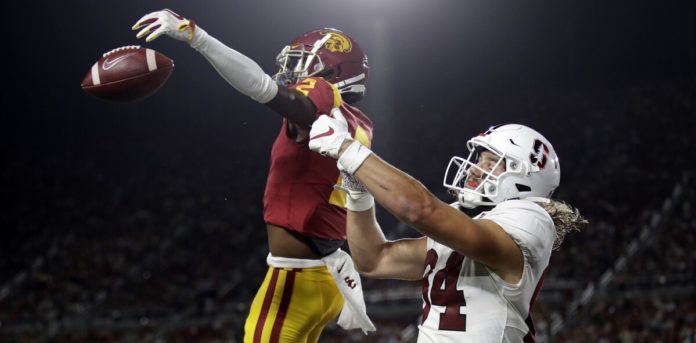
After Pete Carroll, the head coach of the University of Southern California Trojans, left to coach the Seattle Seahawks in 2010, the Trojans were mired in mediocrity for a decade. It spent $45 million to attract Lincoln Riley away to the University of Oklahoma. The result was an 11-win season, the Heisman Trophy winner (from a player that followed Riley from Oklahoma to USC) and a trip at the Cotton Bowl.
Baby, the Trojans are back!
However, even with USC’s imminent move to the Big Ten this success will be very short-lived if Chris Holden (D), wins his way.
Holden, who is Pasadena’s representative, introduced legislation he calls the College Athlete Protection Act. This would eliminate all non-revenue-raising college athletics and make it impossible for any California school to play on the national football stage.
Holden’s bill would force all Division I schools to pay their scholarship athletes their fair market value. Holden states that each student athlete is worth half of the team’s annual revenues, less the cost of their scholarships.
Let’s assume that Trojan football made $100 million and had 50 scholarship players. This would mean that every player, including Caleb Williams, Heisman Trophy winner, and the backup punter would receive $1 million. Holden says that this is their “fair market value”.
Sports Illustrated based its calculations on real data from UCLA and estimated that in 2019, UCLA men’s basketball would have received $389,000 each, football $185,000 each, women’s gymnastics $5500, and women’s volleyball $871 if Holden’s legislation was passed. No one else would have received anything, not even women’s volleyball which didn’t earn enough revenue to trigger the payments under Holden’s legislation.
You will be able to get those results past Title IX regulators.
It gets even better. College athletics is not like for-profit companies. Exceed profits are not returned to the owners. There are no owners. All revenues from basketball and football go to paying salaries of coaches and subsidizing non-revenue-generating sports at each school. Holden’s legislation means that for every dollar Holden transfers from the athletic department from revenue-raising athletes to coaches, that dollar is taken from either Lincoln Riley or another athlete — such as a women’s softball or wrestling player.
Holden had this in mind! His legislation can suspend an athletic director who makes less than $500,000 per year if he removes any sports to pay for the new revenue sharing system.
The legislation sets a limit of $500,000 per year. Riley makes almost $10 million annually.
If Holden’s legislation becomes law, then athletic directors will face a difficult choice: get suspended or reduce all coaches’ salaries to $500,000 per year.
For us mere mortals, $500,000 seems like a lot. It’s almost impossible to attract the national coaching talent required to compete at a national level. This is despite Riley’s tenure indicating that he has a far lower market value.
If Holden’s legislation was passed and Title IX scrutiny survived, there would be a massive exodus in coaching talent from all California college-level football programs. It would mean the end for USC.
Being a Fighting Irish fan, all I can do is shout “Fight on Holden!” Fight on!









